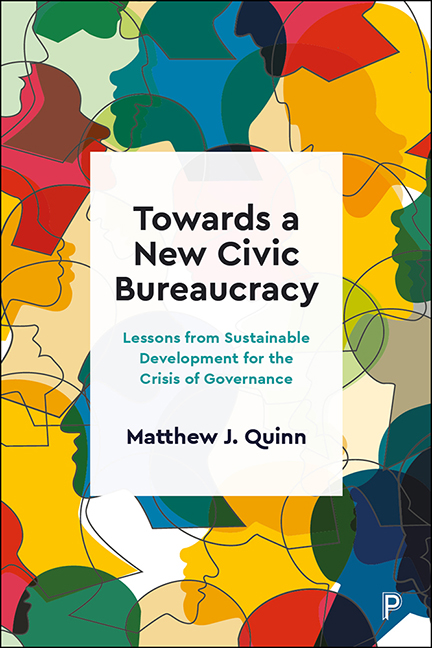Book contents
- Frontmatter
- Dedication
- Contents
- List of figures and tables
- Introduction
- 1 Framing the thinking
- 2 Governance and sustainable development as governmentality
- 3 Bureaucratic practice and governmentality
- 4 Lessons from governing for sustainable development
- 5 A new civic bureaucracy
- Closing words
- Appendices
- References
- Index
2 - Governance and sustainable development as governmentality
Published online by Cambridge University Press: 15 September 2022
- Frontmatter
- Dedication
- Contents
- List of figures and tables
- Introduction
- 1 Framing the thinking
- 2 Governance and sustainable development as governmentality
- 3 Bureaucratic practice and governmentality
- 4 Lessons from governing for sustainable development
- 5 A new civic bureaucracy
- Closing words
- Appendices
- References
- Index
Summary
The real world of interlocked economic and ecological systems will not change; the policies and institutions concerned must. Our Common Future, World Commission on Environment and Development
Personal reflection
Newly minted in 1986 after graduating from college, I joined the civil service with a smattering of governance knowledge gleaned from my reading at university of Plato and Aristotle and the Enlightenment moral philosophers. I arrived with a naïve sense of my future work as the objective balancing of societal needs.
My formal introduction to UK governance, such as it was, came with my induction training as a fast-stream civil servant. I dare say my French colleagues, who pass through L’Ecole Nationale d’Administration, receive a more philosophical perspective, but our British training was one of process and order. The training module ‘Parliament, Government and the Civil Service’ gave a formal view of the respective relations and a practical sense of how to navigate them through case examples and talks by senior, recently retired guest speakers. At no point did we spend time on considering what governance was for – our role was simply to support the process as impartially as we could. There was also nothing, as I can recall, about the public or stakeholders, although we did interestingly receive training in presentation skills. The remaining focus was on the core practice skills of evidence-based advice – economics (especially cost– benefit analysis) and statistics, business and public accountancy and the basics of avoiding judicial review of decisions. It was very much functional not reflective training in keeping with the Anglo-Saxon suspicion of theory called upon by Woodrow Wilson in his 1887 paper on the study of administration (Wilson, 1887).
It was only as I began work in my first civil service role that the nature of governance became clearer. First the centrality of networks and lobbies was obvious. Developing policy meant working externally with others. For me, doing this felt important both to understand the issues fully and emotionally, rather than abstractly, and to enable policy making to be about going on a journey together with stakeholders.
- Type
- Chapter
- Information
- Towards a New Civic BureaucracyLessons from Sustainable Development for the Crisis of Governance, pp. 14 - 38Publisher: Bristol University PressPrint publication year: 2022



